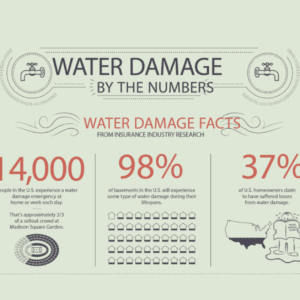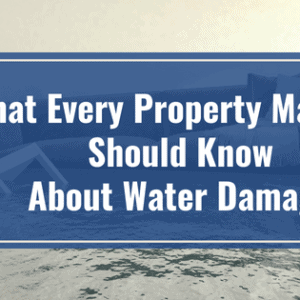If you’ve ever dealt with a leaky roof, burst pipes, or flooding, you know just how all types of water damage can be devastating to your property and cause headaches with your insurance company. Unfortunately, according to The Hartford, water damage claims are one of the most common types of insurance claims filed by property owners, making up 15 percent of all small business property damage and liability insurance claims.
Stopping small leaks before they become large water damage claims can save you thousands!
Taking the time to prevent water damage to your property is always better than dealing with the aftermath. Whether you are a residential or commercial property manager or a building owner, taking the necessary precautions to prevent water damage claims is essential.
Avoid the lengthy insurance claims process by following the practical steps below that you can take to minimize the risk of water damage and keep your property safe.
1. Install a water detection system
Leak detection systems help property owners proactively protect their assets and stop water leaks in their tracks, making them our top recommendation for a preventative measure to take against water damage. These systems monitor building environments and water usage and alert users when unusual activity is detected. The point of these systems is to be notified when a leak occurs so that it can be stopped before becoming a more significant and expensive issue.
A water detection system can be beneficial in areas of your property that need to be regularly monitored, such as basements and crawl spaces. A water detection system can help prevent water damage by alerting you to leaks early, allowing you to address the problem before it causes significant damage.
We’ve done our research, and we recommend the Alert Labs water leak detection system as the best water damage prevention solution. The Alert Labs product line features an array of smart devices designed to help protect against your property water damage. These devices work to monitor building environments and send alerts to the user’s phone or computer for leaks, unusual water usage, abnormal temperature, and humidity. In addition, the sensors send real-time alerts that allow property managers and building engineers to take fast action before small water leaks become costly issues.
Alert Labs’ smart sensors do not require a wifi connection; each smart device is cellular-enabled. Cellular-enabled systems provide constant coverage – cellular outages are very infrequent compared to network outages. This means that you’ll receive notifications on the status of water systems in your building, regardless of if your internet or electricity is working. This is a considerable asset in places that experience natural disasters that affect electricity. Another benefit of cellular-enabled systems is that they are speedy to install, helping you get your system up and ready to protect your property faster.
Some disasters you can’t control, but a water detection system can help you control your response. If you are alerted the instant disaster strikes, chances are you’ll have a much easier time preventing damage. For more information click HERE
2. Regularly inspect your property for leaks
Another key preventative measure is to identify any potential sources of leaks at your property. Regularly inspect your property for signs of water damage, including mold, discoloration, and soft spots on walls and floors that may point to leaks. Check under sinks, around toilets, and behind appliances for signs of leaks. Standing water caused by leaks can cause mold, typically requiring expensive mold remediation and clean-up services.
3. Maintain your plumbing system
One of the most common causes of water damage is plumbing issues. Maintain your plumbing system by regularly inspecting pipes for leaks and corrosion, ensuring all plumbing fixtures like water heaters and faucets are in good working order.
4. Install a sump pump
A sump pump is a device installed in a property’s basement or crawl space of a property to remove excess water. Property managers or homeowners in areas prone to flooding or with high water tables may find a sump pump to be particularly beneficial. A sump pump can help prevent water damage by quickly removing excess water before it can cause damage to your property or home.
5. Keep your gutters and downspouts clean
Gutters and downspouts are crucial in directing water away from your property. However, when they are clogged with debris, water can accumulate and cause damage to the roof and walls. To prevent water damage caused by clogged gutters and downspouts, clean them regularly and ensure they are in good working order.
6. Maintain your roof
To prevent water damage caused by a leaking roof, it is essential to maintain your roof, especially in the winter. Accumulated ice and snow beyond the roof’s load-bearing capacity can hinder proper drainage, resulting in costly water damage. This includes inspecting the roof for damage and addressing problems as soon as they arise. Otherwise, ice dams and heavy rain can cause leakage.
7. Install a backup generator
A backup generator is a device that can be installed on your property to provide power in the event of a power outage. It can be particularly useful in areas prone to severe weather events like hurricanes and tornadoes. A backup generator can help prevent water damage by ensuring that critical systems, such as sump pumps and water detection systems, continue to function during a power outage.
8. Know where your shut-off valves are located
In the event of a water leak or other plumbing problem, knowing where your shut-off valves are is essential. Shutting off the water supply can prevent further damage and give you time to address the issue. Make sure to locate your shut-off valves and ensure that they are in good working order so that you can manage water flow as needed.
9. Ensure proper ventilation
Proper ventilation is essential in preventing water damage caused by mold and mildew. Ensure your property is adequately ventilated, particularly in areas prone to moisture, such as bathrooms and kitchens. Consider installing exhaust fans in these areas to ensure proper ventilation.
10. Seal cracks and gaps in your building
A little bit of caulk can go a long way! Sealing gaps in your building’s foundation can prevent cold air from seeping in and causing pipes to freeze and burst. Burst pipes can be especially damaging, as they can cause massive amounts of water to flood your home and require professional water damage restoration services. As an added benefit, sealing your building can make it more energy efficient, helping reduce heating and air conditioning costs.
11. Maintain appliances
For homeowners and property managers alike, maintaining appliances like washing machines and refrigerators is especially important. Appliances are the most common cause of in-home water damage.
It’s essential to keep a close eye on the condition of your washing machine and refrigerator hoses, as they can become a common source of water damage for property owners. As these hoses age, they can become brittle and develop leaks, leading to costly damage. Typically, a hose’s lifespan is around five years. Regularly replacing these hoses can help avoid a significant mess and expensive repairs. So, make sure to keep a schedule for replacing hoses in line with manufacturer recommendations to keep your appliances in good condition and prevent water damage to your property.
12. Check your water pressure
Pipe bursts are more common when water pressure is set too high. High water pressure can also cause strain on your plumbing system which can lead to loosened joints or pinhole leaks in the pipes. Check-in on the water pressure at your property every so often to ensure it’s set at a level that’s right for your needs yet not too high to cause issues. For residential properties, the standard psi is between 30 and 80, but the sweet spot is between 60 and 70. At a commercial property, the water pressure should be at least 40 psi, not to exceed 80 psi.
Conclusion on preventing water damage
Following these steps will help drastically reduce the chances of having a water damage claim at your business or home. However, if a water damage claim needs to be made, be sure to move non-damaged items out of harm’s way quickly and file a claim as soon as possible.
Preventing water damage is crucial for any property manager or homeowner looking to save money, time, and stress associated with insurance claims. By implementing the tips outlined in this blog post, such as regularly checking for leaks, maintaining gutters and downspouts, and installing water alarms, you can significantly reduce the risk of water damage to your property. In addition, by staying proactive and vigilant in maintaining your property, you’ll enjoy the peace of mind that comes with a dry and secure property.



